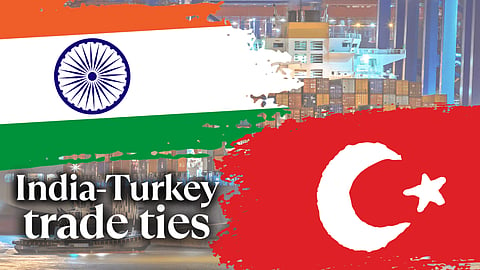

With emotions running at an all-time high owing to ‘Operation Sindhoor’, which was temporarily halted, suspended, as stated by an Indian Executive, and a ceasefire, as claimed by Trump - both essentially conveying the same outcome - until a formal agreement is reached, if ever there is to be, the stand of Turkiye and Azerbaijan has drawn the ire of Indian society.
Turkiye and Azerbaijan's statements in support of Pakistan against India, and Turkiye supplying drones are being viewed as a very active association in waging war against India and have come in for heavy criticism. The calls for a boycott of trade and all economic activities benefiting Turkiye and Azerbaijan are growing louder in the media and among the public at large.
Furthermore, being very proactive, travel agencies are cancelling tourist bookings to these countries, highlighting the mounting anger towards them due to their support to Pakistan and this is drawing lot of traction in social media circles.
The stand of Azerbaijan and Turkiye is not new, as they have consistently sided with Pakistan in the past. Turkiye, in particular, has maintained a pro-Pakistan stance since the country’s inception. The underlying cause of their support appears to be rooted in religious affinity, which doesn’t seem like a very pragmatic approach. Notably, this stance overlooks the significant fact that India has a larger Muslim population than Pakistan.
By making religion the basis of their foreign policy stance, Turkiye and Azerbaijan may be setting themselves up for scrutiny in the future – a stance that could potentially even question Turkiye’s place in alliances with western powers, though for the time being it appears to be courting both the blocks, with a fair amount of success. Earlier, S400 system from Russia and now purchase of AMRAAMS (Air to Air missiles) from USA is imminent.
Calls for boycott of Turkiye & Azerbaijan
The Indian public and media are citing Turkiye’s support to Pakistan as treachery, especially given India’s timely help to Turkey during the 2023 earthquake. This being perceived betrayal, has sparked intense outrage, with many questioning the logic behind Turkiye’s and Azerbaijan’s actions. The fact that India extended a helping hand to Turkiye in times of need makes their current stance all the more jarring, fueling accusations of ingratitude and purely biased support.
What we need to understand is that the foreign policy and trade cannot be based on emotions alone; numerous other factors weigh in, influencing decision-making. A nation of India's stature always strikes a balance between emotions and ground realities.
Similar debates and emotions emerged after the Galwan clash too, asking for banning imports from China. The public needs to introspect, and the media should guide the narrative, how it has played out since then.
Examining the trade balance between India and China then and now can provide valuable insights, fostering a better understanding of the complex global landscape we navigate. The huge trade deficit between India and China is increasing in favour of China, with every passing year. Banning of imports would have invited reciprocal action.
While the overall volume which is and was in favour of China, would have suffered but the percentage wise the figures show that that out of the total amount of exports India makes, the percentage of exports to China is more than their share of exports to India. Hence this is the trickiest situation as an emotional move would have backfired on us.
This nuanced perspective can help India make informed decisions, weighing both emotional and pragmatic considerations. By doing so, India can try to manage its relationships with countries like Turkiye and Azerbaijan while protecting its national interests. Even the USA has termed Turkiye as a difficult ally. In the context of India-Pakistan, Turkiye is perhaps unable to come to terms with the present; it's still living in the caliphate era.
Foreign policy is not based on emotions
The foreign policy and trade cannot be based on emotions alone; numerous other factors weigh in, influencing decision-making. A nation of India's stature always strikes a balance between emotions and ground realities. The trade balance between India and both the supporter countries of Pakistan needs careful evaluation.
Any action is bound to have a reaction, which saner minds need to consider. In the FY 2023-24, India’s exports to Turkiye were $6.65 billion, and imports were $3.78 billion. As such the Trade balance is hugely in favour of India. The trade balance with Azerbaijan is in its favour due to import of crude Oil. Here needs to weigh in the factor that India wants to diversify its oil imports.
A crucial consideration is the significance of these imports to our industry, including the potential impact on supply chains, production costs, and availability of alternative sources that could mitigate any disruptions. We must also assess the likely effects on their industries and market presence if our exports are halted, including potential losses in revenue, market share, and the potential gains for competitor exporters who might fill the gap. Additionally, the amount spent by Indian tourists in Turkiye and Azerbaijan and the value added to their economies through tourism are important factors that need to be evaluated.
All these elements must be carefully considered in the overall calculation of losses and gains. A responsible media should clearly explain these complexities to the public, highlighting the intricacies involved.
Furthermore, foreign policy considerations, including the message we aim to convey globally, must be factored into the final decision-making process. It's time for the public to gain a deeper understanding and for the media to educate them on these critical issues, ensuring informed decision-making that aligns with national interests.
The shrill boycott calls without a deep understanding does not serve the purpose. The potential gains, losses, image building, subtle messaging, national honour and pride, diplomacy and foreign policy, with the greater aim in mind helps in arriving at a justified decision.
Have you liked the news article?